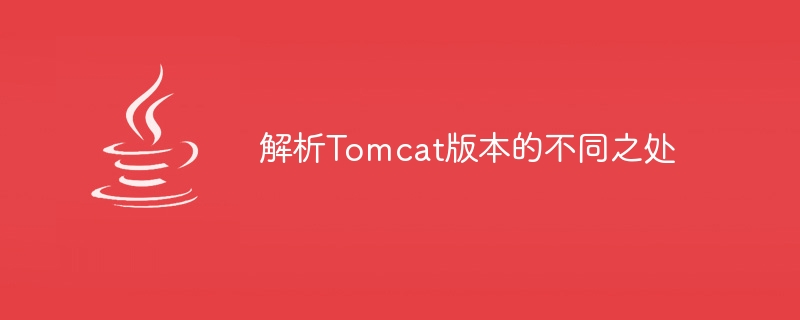

Tomcat is an open source Java Servlet container that is widely used in the deployment and operation of Java Web applications. Over time, Tomcat has released multiple versions, each with its own characteristics. This article will analyze the differences between Tomcat versions and provide specific code examples.
@WebServlet("/hello")
public class HelloServlet extends HttpServlet {
protected void doGet(HttpServletRequest request, HttpServletResponse response) throws ServletException, IOException {
response.setContentType("text/html");
PrintWriter out = response.getWriter();
out.println("<html>");
out.println("<body>");
out.println("<h1>Hello, World!</h1>");
out.println("</body>");
out.println("</html>");
}
}@WebServlet("/hello")
public class HelloServlet extends HttpServlet {
protected void doGet(HttpServletRequest request, HttpServletResponse response) throws ServletException, IOException {
response.setContentType("text/html;charset=UTF-8");
PrintWriter out = response.getWriter();
out.println("<html>");
out.println("<body>");
out.println("<h1>Hello, 世界!</h1>");
out.println("</body>");
out.println("</html>");
}
}@WebServlet("/hello")
public class HelloServlet extends HttpServlet {
protected void doGet(HttpServletRequest request, HttpServletResponse response) throws ServletException, IOException {
response.setContentType("text/html;charset=UTF-8");
AsyncContext asyncContext = request.startAsync();
asyncContext.start(new Runnable() {
@Override
public void run() {
try {
PrintWriter out = asyncContext.getResponse().getWriter();
out.println("<html>");
out.println("<body>");
out.println("<h1>Hello, 世界!</h1>");
out.println("</body>");
out.println("</html>");
asyncContext.complete();
} catch (IOException e) {
e.printStackTrace();
}
}
});
}
}@WebServlet("/hello")
public class HelloServlet extends HttpServlet {
protected void doGet(HttpServletRequest request, HttpServletResponse response) throws ServletException, IOException {
response.setContentType("text/html;charset=UTF-8");
response.getWriter().println("<!DOCTYPE html>");
response.getWriter().println("<html>");
response.getWriter().println("<body>");
response.getWriter().println("<h1>Hello, 世界!</h1>");
response.getWriter().println("</body>");
response.getWriter().println("</html>");
}
}Through the above sample code, we can see that different versions of Tomcat have gradually enhanced their support for Servlet and JSP specifications, and have made some improvements in performance and security. It is crucial to choose a Tomcat version that suits your project needs and environment. It will not only improve the stability and performance of the project, but also provide a better development experience. The latest version of Tomcat can be obtained from the official website (https://tomcat.apache.org/).
The above is the detailed content of Compare the features of different versions of Tomcat. For more information, please follow other related articles on the PHP Chinese website!
 attributeusage
attributeusage
 Website domain name valuation tool
Website domain name valuation tool
 What are the cloud servers?
What are the cloud servers?
 How to solve the problem of missing steam_api.dll
How to solve the problem of missing steam_api.dll
 Ethereum browser query digital currency
Ethereum browser query digital currency
 The main components that make up the CPU
The main components that make up the CPU
 What are the java file transfer methods?
What are the java file transfer methods?
 How to set the computer to automatically connect to WiFi
How to set the computer to automatically connect to WiFi
 Is Bitcoin trading allowed in China?
Is Bitcoin trading allowed in China?




